Vitra's Repad adds an elegant touch to the décor of your home office. The minimalist writing pad is designed by the Bouroullec brothers and made entirely from recycled materials: the high-quality leather is actually remnants from the production of Vitra's own furniture. The leather desk pad protects the tabletop marks and scratches, provides support for writing and keeps notepads, papers, magazines and the laptop firmly in place.
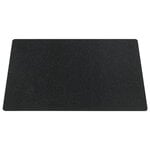


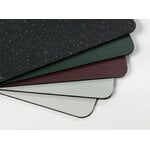
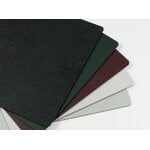
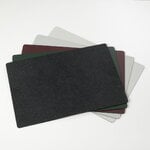
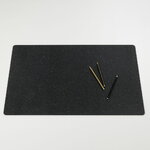
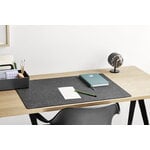
Repad, natural black
Vitra
Description
Vitra's Repad adds an elegant touch to the décor of your home office. The minimalist writing pad is designed by the Bouroullec brothers and made entirely from recycled materials: the high-quality leather is actually remnants from the production of Vitra's own furniture. The leather desk pad protects the tabletop marks and scratches, provides support for writing and keeps notepads, papers, magazines and the laptop firmly in place.
Product details (4)
- Material
- High-quality furniture leather (leather remnants from the production of Vitra furniture)
- Colour
- Black
- Width
- 27.56 in (70 cm)
- Depth
- 18.9 in (48 cm)
- Product ID
Designer
The Bouroullec brothers, Ronan (born 1971) and Erwan (born 1976) are born in Brittany, France and their design office is situated in Paris. The brothers have emerged as one of the most succesful designers in France and they have designed to companies such as Artek, Iittala, Vitra, Alessi, Magis, Flos and Hay. The Bouroullec brothers have also won numerous awards, for example the Steelwood Chair for Magis won the prestigious Compasso D'Oro in 2011.
View all productsReviews (1)
5
Based on 1 reviews
-
A
anonyymi
Kirjoitusalusta on tyylikäs ja pysyy hyvin paikoillaan. Aika näyttää kestävyyden käytössä. Olen tyytyväinen.
212 days ago
Sustainability
The Product Sustainability Framework, our criteria of sustainable design, helps you find the most sustainable products in our selection. Read below which sustainability criteria this product has met.
Working conditions & labour 7/9
-
Equal opportunities for all employees
-
Commitment to UN Global Compact, fair compensation for all employees
-
Corporate responsibility requirements defined and communicated for suppliers
-
Systematic work for improved inclusion and well-being in the workplace
-
Transparent supply chain
-
Suppliers' compliance to a code of conduct ensured
-
Compliance to the UN Guiding Principles on Business and Human Rights ensured in the supply chain
Eco-friendly production 7/9
-
Fair and resource-wise water-use in production
-
No incineration or landfilling of returned items
-
No use of endangered species as materials
-
No direct environmental emissions or waste (excl. GHGs) from production
-
Production and material sourcing that respect biodiversity, animal rights, and natural ecosystems
-
Material-efficient and ecological packaging
-
No potentially harmful chemicals used in own production
Climate impact 5/8
-
Company's direct greenhouse gas emissions identified and commitment to reduction
-
Product's carbon impact identified and commitment to reduction
-
Guidance on energy- and eco-efficient use of the product
-
Contribution to climate initiatives beyond the brand’s direct operations
-
100 % renewable energy in own production and operations
Sustainable materials 5/6
-
Sustainable and long-lasting material choices
-
No harmful or hazardous substances
-
Responsible raw material sourcing and production
-
Materials suited for circularity: monomaterials, recyclable finishings, renewable or recycled contents etc.
-
Ecological materials: natural, biodegradable, recyclable or recycled contents
Circular design 4/5
-
High aesthetic quality promoting long-term use of the product
-
Technically durable product design and material choices
-
Design for enduring life-long quality
-
Design and support for product maintenance, repair and upgradability











